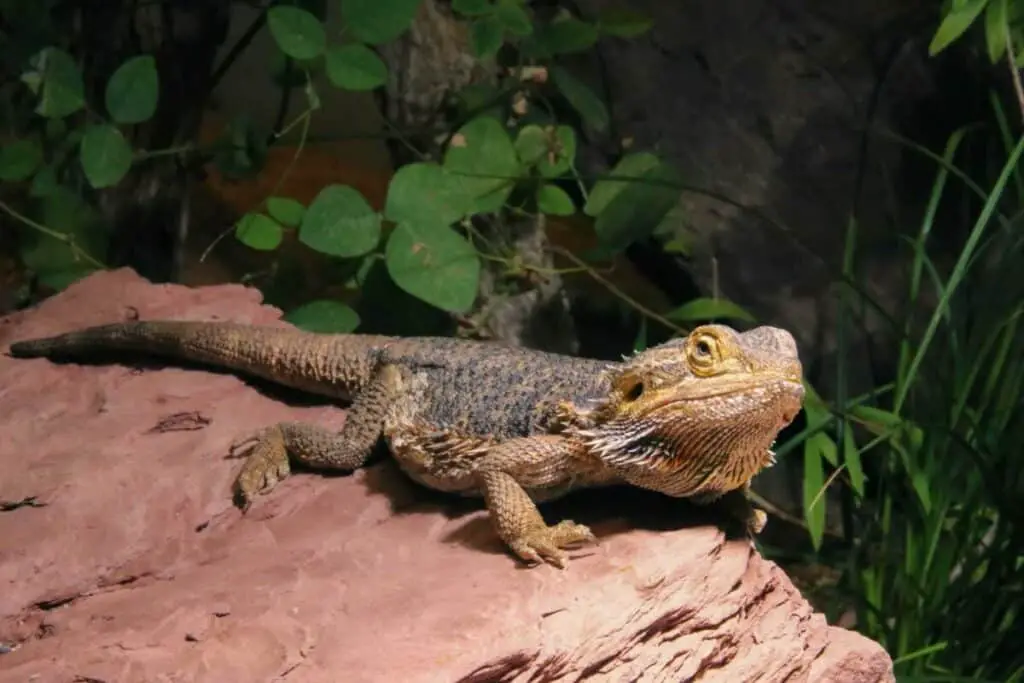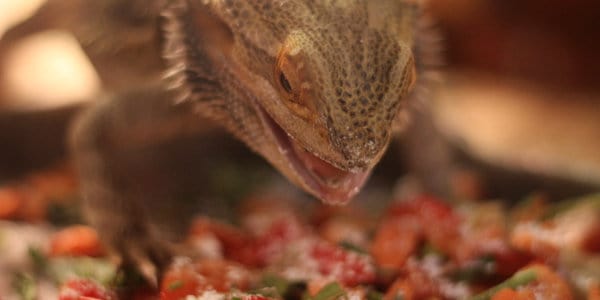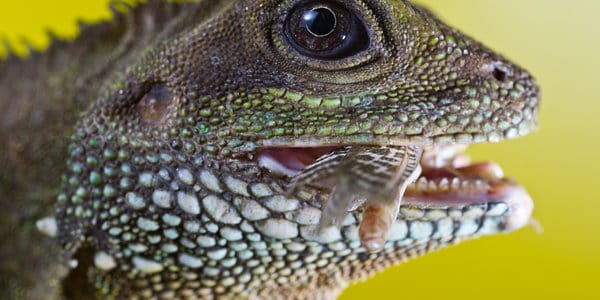Have you recently added a baby bearded dragon to your family? Baby dragons are friendly, energetic, and playful pet reptiles, but it can be tricky to know what to feed them if you’ve never taken care of one before.
So, what should you know as a bearded dragon owners and what should your bearded dragon’s diet look like?
You should feed your baby bearded dragon both animal-based and plant-based foods. The diet should contain approximately 70% protein and 30% plant matter because baby beardies require more protein than adults for healthy growth and development.
This article will discuss a few topics related to the dietary requirements of baby bearded dragons. Read on to learn everything you need to know about feeding your pet.
What Do Baby Bearded Dragons Eat?
After hatching, baby bearded dragons independently search for their food. They have an excellent appetite and will eat almost anything in their way because they’re omnivorous (meaning their diet comprises both plants and animals.)
Baby beardies eat live insects, vegetables, fruits, and flowers. However, they require some supplements for optimal growth. It’s essential to balance their diets to avoid overfeeding, compaction, obesity, and other food-related health problems.
Now, let’s look at what your baby dragon should consume to grow into a healthy baby bearded dragon and live a happy life:
Insects
Insects are baby beardies’ favorite food. They typically start munching on live insects two to three days after hatching.
Most of these insects are suitable for baby bearded dragons (hatchlings and juvenile bearded dragons) as they provide essential fats and proteins.
Baby bearded dragons require 50% to 75% proteins to meet their dietary needs.
Since baby dragons love insects, they can grab any live critter that they come across. Their list of favorite insects includes:
- Crickets and locusts.
- Black soldier fly larvae.
- Cockroaches.
- Earthworms and butter worms.
- Red worms and super worms.
- Dubia roaches.
Baby bearded dragons can easily consume venomous or poisonous insects, including fireflies and wasps. Therefore, it’s crucial to watch out, especially when you let your baby Beardie bask or play outdoors.
You’ll also want to avoid feeding them any insects you collect in your house or garden, as they could have trace amounts of pesticides or other toxic chemicals.
The best source of insects for your baby Beardie is a pet store or a feeder insect supplier.
Here, you’ll find ‘gut-loaded’ insects that have been on special supplemented diets and contain extra nutrients. Alternatively, you can rear chemical-free insects at home.
The best insects to rear for your baby bearded dragon include:
- Crickets.
- Dubia roaches.
- Waxworms.
Size matters when feeding baby Beardies. It’s dangerous to give your baby bearded dragons insects that are larger than the space between the dragon’s eyes.
It will be hard for your bearded dragon to chew and digest these large-sized insects. Moreover, ingesting the big chunks might cause other health complications, including impaction, partial paralysis, loss of motor control, and seizures. Worst-case scenario, your baby bearded dragon could die.
Therefore, it’s best to start by introducing small-sized insects 一such as pinhead crickets and newly molted worms一 when your baby bearded dragon is only a hatchling.
You can increase the insect sizes as they approach the juvenile stage (Juvenile bearded dragon). It’s also advisable to remove the insect’s outer shell to make it palatable for your pet lizard.

Plant Matter
Baby bearded dragons obtain proteins and fats from insects. But, they also need other nutrients, including vitamins, iron, and minerals, to be healthy.
Plants supply these nutrients, making plant matter vital for your baby Beardie’s diet.
Since baby Beardies require more protein than plant matter, they may become picky when you introduce veggies to their diet.
To keep your pet’s appetite up, incorporate a wide variety of plant-based foods, including green, leafy vegetables, fruits, and flowers.
Some of the best plant-based foods to feed your baby bearded dragon include:
- Collard and dandelion greens.
- Mustard and turnip greens.
- Endive.
- Green beans and peas.
- Squash and sweet potato.
- Carrots.
- Bell peppers.
- Grape and mulberry leaves.
- Flowers such as hibiscus, petunia, violet, poppy, and Cape honeysuckle blossoms.
Mix the veggies to make a salad to avoid pickiness and increase appetite in your baby Beardie.
Ensure that you’ve washed the vegetables properly to remove dirt and parasites, and minimize cooking them because that reduces their nutritional value.
You can also find salad mixes in some pet stores or order online. For example, the Zilla Omnivore Mix (available on Amazon.com) is a nutritious reptile food containing a nice blend of veggies, insects, and Calcium.
The ingredients come dehydrated to extend their shelf life, but you only have to mist the mix with some water before feeding your bearded dragon.
Note: If you don’t have flowers growing in your backyard, you can get some ‘rejects’ from florist shops. Just be sure to confirm that the flowers have been grown without chemicals. Any traces of pesticides in the flowers can be detrimental to your baby bearded dragon’s health.
Apart from veggies and flowers, baby bearded dragons eat fruits, including:
- Bananas (with peels).
- Blueberries
- Raspberries.
- Strawberries.
- Apples.
- Peaches.
- Watermelons.
- Figs.
- Mangoes.
- Papayas.
- Kiwis.
- Guavas.
But since fruits contain a lot of sugar and minimal minerals, you should only offer them occasionally as treats. Also, ensure that you remove any seeds (or pits) from the fruits and then cut them into small pieces.
Supplements
Baby beardies require specific nutrients and minerals to achieve their growth milestones. For instance, they need Calcium, iron, phosphorus, and Vitamin D for development.
However, some diets may lack the optimal levels of essential nutrients. Its important to feed a baby bearded dragon the needed minerals to avoid diseases such as metabolic bone disease.
That’s why you need to add some supplements to your pet’s diet. Calcium supplements (without added Vitamin D and phosphorus) are the most common additions to the diets of bearded dragons.
Calcium deficiency causes stunted growth, so it’s best to offer supplements with this all-important mineral thrice per week.
Your baby bearded dragon might also need multivitamins at least once per month. The best way to add supplements to your Beardie’s food is by sprinkling it on salads (vegetable mixes). You can also dust calcium powder on insects before feeding your pet.
Water
Bearded dragons are pretty picky when it comes to drinking water. Their natural environment has few water sources, so they mainly obtain water from food and dew.
Nevertheless, you should always ensure that your baby bearded dragon is hydrated, as water deficiency causes constipation.
You can provide a shallow bowl with clean, fresh water daily. But since bearded dragons may not recognize a water bowls as a source of drinking water, they might refuse to drink from it. If that happens, add some water to their vegetables.
Alternatively, mist your bearded dragon tank to mimic their typical environment 一they’ll lick the water droplets on the glass surfaces. Mimicking baby bearded dragon habitat helps them to behave normally.

Foods to Avoid Feeding Your Baby Bearded Dragon
Not all animal and plant-based foods are safe for your baby bearded dragon. Some are toxic, while others have high contents of nutrients that could harm your bearded dragon.
On the other hand, some foods have low nutritional value and may cause nutrient deficiencies in the long run.
Knowing these foods allows you to minimize their potential negative health impact by reducing their quantity or excluding them from your baby Beardie’s diet.
Here are foods to avoid or use sparingly when feeding your baby bearded dragon:
| Food Type | Reason not to Feed |
| Glowing and venomous insects. | They contain toxic chemicals that can harm your baby Beardie. |
| Onion and garlic. | These contain thiosulfinates that are toxic to bearded dragons. |
| Chives. | Chives have a high concentration of oxalic acid, which is not good for Beardies. |
| Avocado. | Avocados are poisonous to bearded dragons. |
| Lemons and oranges. | Citrus fruits contain citric acid, which upsets the stomachs of bearded dragons. |
| Iceberg, celery, and head lettuce. | These have low nutritional value. |
| Kale, cabbage, mustard greens. | They may contain goitrogens, which lower thyroid function and can cause hypothyroidism. |
| Swiss chard, beet greens, spinach. | These vegetables pack a high concentration of oxalates, which minimize the absorption of calcium. |
| Fish, chicken, and beef. | These meats contain high levels of phosphorous, which can be harmful to your Beardie’s health |
How Many Times Should Baby Bearded Dragons Eat in a Day?
Baby bearded dragons require food more often than adult bearded dragon because they’re in the growth stage.
A consistent supply of a nutritious, well-balanced diet will ensure that your baby bearded dragon attains optimal growth.
That’s why it’s essential to have a well-thought-of food schedule that provides your spiky pet with the nutrients needed to support growth and development.
You should feed your baby bearded dragons two to three times per day. However, some pet parents have daily schedules going up to four times. Whichever feeding frequency you choose, be sure to keep the portion size consistent.
Since your baby bearded dragon needs over 50% protein (ideally 75%), insects should have the lion’s share in your Beardie’s bowl.
Generally, a bearded baby dragon will have 20 – 40 insects per day. But since every animal has different dietary needs, you might want to work out an optimal number of insects for your pet.
Here’s how to determine how many crickets or dubia roaches your pet will have per minute:
- Serve a handful of insects (preferably dubia roaches as they’re easily digestible) in a bowl and note down the number.
- Give your baby bearded dragon a 10 -15 minute allowance to see how many insects they can eat.
- After that duration, count how many dubia roaches are left in the bowl.
- Calculate the number of eaten dubia and divide them by the minutes your bearded dragon has taken to consume them. This figure will help determine how many insects you’ll be feeding your baby bearded dragon per serving.
- Remove the uneaten insects.
Note that some baby bearded dragons will be too full or picky to eat veggies after munching on insects. Therefore, it’s best to mix the insects and vegetables in one serving.
For instance, you can serve about ten crickets, a handful of collard greens, and a slice of carrot per meal.
Here’s a chart showing an example of a feeding schedule for baby bearded dragons:
| Time | Insects | Vegetables/ Fruits/ Flower (All chopped) |
| 9 AM | 10 small dubia roaches | 2 collard greens, a slice of squash, a slice of strawberry* |
| Noon | 10 small crickets` | 2 turnip greens, 1 dandelion flower, 1 kale, a slice of skinned banana* |
| 3 PM | 10 small dubia roaches | 2 green beans, a slice of pumpkin, 1 bell pepper slice. 1 apple slice* |
| 6 PM | 10 small crickets | 2 collard greens, 1 slice of carrot, 1 grape |
Notes: The * sign indicates that the food in question is optional (occasional).
Can Your Baby Bearded Dragons Eat Dirt?
Like all young ones, baby bearded dragons can mistake other substances for food. Their large appetites can drive them to eat anything they find on their way.
Therefore, it’s essential to monitor your baby lizard feeding behavior and ensure that they’re well-nourished.
Your baby bearded dragon can eat dirt if you leave them outdoors unsupervised. A Beardie can also munch on sand if you’ve used it as substrate, especially if he/she is suffering from a Calcium deficiency.
Here are a few measures you can take to prevent your baby bearded dragon from eating dirt:
- Use an easy to clean or dispose of substrate – avoid using sand.
- Use clean feeding bowls.
- Feed a baby bearded dragon promptly and properly.
- Always ensure that your Beardie’s food is clean.
- Use supplements to prevent calcium deficiency.

Conclusion
Baby bearded dragons need a well-balanced diet comprising animal and plant-based foods. They primarily feed on live insects, veggies, flowers, and fruits.
However, baby bearded dragon also require some supplements for optimal growth and development. Mimicking baby bearded dragon heat environment helps them to behave normally.
As you noticed, feeding baby bearded dragons has some difference than adult bearded dragons.